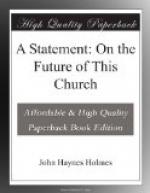well be regarded as a part of the whole problem before
us, and I therefore made careful mention of it last
Monday night. Secondly, and more important, I
stated my desire that the church which I should serve
tomorrow, might itself be undenominational, at last
to the degree implied by my conception of what I have
called the community church. By this I meant
that the church should proclaim [16] as its primary
interest and aim identification with, and service
of, the people of its community, to the subordination,
and, if necessary, the ending of its connection with
persons of various and scattered communities who have
no other bond of union than that of a single denominational
inheritance. Was I wrong when I ventured the
assertion at the meeting of our Society, that in this
church we have already moved far in this direction?
Unconsciously, in the last dozen years, it seems to
me, we have been moving out of the denomination, into
the community. Nearly every interest in this
parish is a community and not a denominational interest.
Our natural affiliations as a church in this city
have not been so much with churches of our own denomination,
as with churches of various denominations distinguished
like ourselves as predominantly civic, or community,
institutions. This congregation is an independent
congregation. If the Unitarian name adheres to
it at all, it is to the embarrassment of those whose
Unitarianism is their pride, and to the confusion
of those who, not Unitarians either by birth or conviction,
desire to join us in spirit and active work. For
years, like “the chambered nautilus,”
we have been outgrowing our denominational shell,
and seeking “more stately mansions.”
Is it not time, now, that we left this “outgrown
shell,” and became at last the full and free
community institution of which I speak? Should
we not at least clear ourselves of ancient entanglements
to such degree that we may invite people openly and
honestly to come into our portals not because they
want to profess themselves Unitarians, but because
they want to confess themselves lovers and servants
of mankind?
Again, I stated at last Monday’s meeting my
desire that the church which I shall serve tomorrow,
may have a name which means something in the language
and thought of our time. The application of this
principle to our church is obvious. The name,
Church of the Messiah, is precious to many of us,
because it awakens memories and revives tender associations.
But a name [17] is important not from the standpoint
of those who know what it means, or ought to mean,
but of those who do not know. The name of a church,
like that of a business, is an advertisement.
It is a symbol, a slogan, a banner. It should
tell at once to everybody what is behind it, what it
stands for; and this is exactly what our name does
not do, except to the initiate. Dr. Savage tried
to save the situation by associating with the name,
Lowell’s familiar line, “some great cause,
God’s new Messiah.” I have tried




